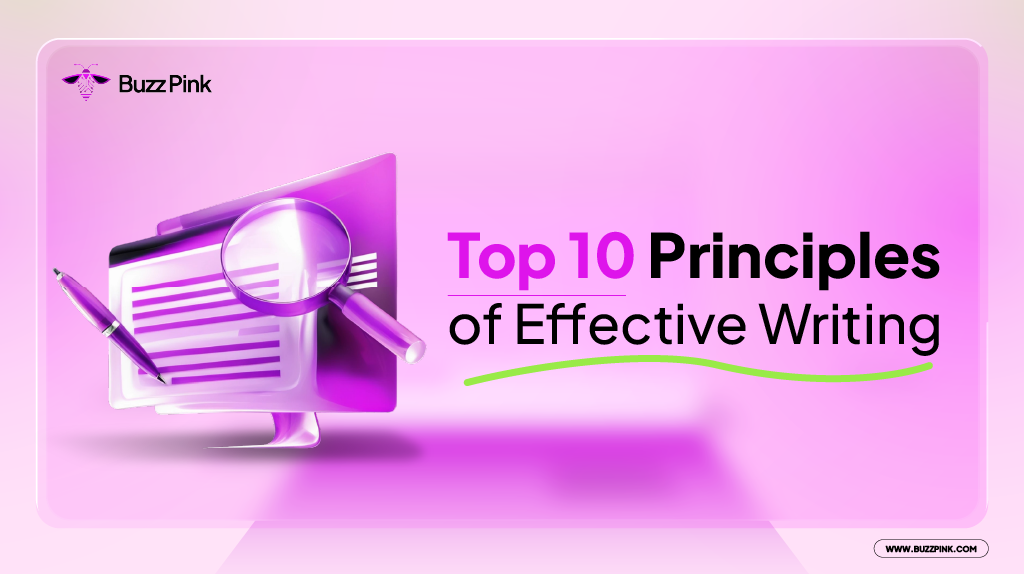Effective writing is more than just stringing words together; it’s also about conveying a message in a way that’s simple to understand, engaging, and produces tangible results. The principles of effective writing assist us in writing more clearly, concisely, and organized, allowing readers to understand our meaning without confusion. Applying these principles strengthens and professionalizes our writing, whether for school assignments, blogs, or work.
The principles of effective writing are important rules or guidelines that help people write correctly and efficiently. Good writing serves as a bridge between the writer and the reader; the stronger the bridge, the smoother the message will be delivered. These principles can help make writing more lively, engaging, and memorable to anyone who reads it.
What Is Effective Writing?
 Effective writing means conveying a message in a clear, precise, and understandable manner. Effective writing does not confuse readers but rather allows them to quickly grasp the author’s ideas. For example, if you’re writing about “how to save pocket money,” make sure it’s clear, logical, and concise.
Effective writing means conveying a message in a clear, precise, and understandable manner. Effective writing does not confuse readers but rather allows them to quickly grasp the author’s ideas. For example, if you’re writing about “how to save pocket money,” make sure it’s clear, logical, and concise.
Effective writing is also concise. This means you don’t have to include unnecessary words or sentences. Each sentence should serve a purpose and help readers understand the main point of your writing. This improves the clarity and readability of your writing.
Furthermore, good writing is always accurate. This means that the information conveyed is correct and reliable. For example, if you’re writing about historical facts or specific data, make sure the source is accurate so readers can trust it. Accurate information portrays the writer as professional and trustworthy.
Finally, effective writing integrates the author’s intention with the reader’s comprehension. So, it’s not just about good writing; it’s also about how the writing can move the reader to take action, such as becoming motivated, learning something new, or joining an opinion.
Why Writing Effectively Matters
 Effective writing is essential because it allows us to communicate ideas clearly and persuasively. Without effective writing, readers may misunderstand or ignore messages. In today’s world, having good writing skills earns you respect at school, work, and in everyday life.
Effective writing is essential because it allows us to communicate ideas clearly and persuasively. Without effective writing, readers may misunderstand or ignore messages. In today’s world, having good writing skills earns you respect at school, work, and in everyday life.
Effective writing also shows respect for the reader. Writing concisely and clearly demonstrates that we value their time and attention. People prefer to read writing that is concise rather than rambling aimlessly.
Furthermore, being able to write effectively can help us achieve our goals. Clear and neat writing, such as in a job application letter, a professional email, or a social media post, can attract attention and produce better results.
Read More: 5 Tips on How to Avoid AI Detection in Writing
Finally, effective writing helps us think more clearly. When we write on a regular basis, we naturally learn to organize our thoughts and ideas logically. So, writing is more than just words; it’s also a way to train the brain to think in a structured way.
The 10 Principles of Effective Writing
 To write well, we need to understand the principles of effective writing. These principles are like basic rules that make writing easier to read and more engaging. Without them, writing can feel confusing and unfocused.
To write well, we need to understand the principles of effective writing. These principles are like basic rules that make writing easier to read and more engaging. Without them, writing can feel confusing and unfocused.
Here are ten important principles of effective writing that you can apply in a variety of situations, from school assignments and articles to professional writing.
1. Clarity
Clear writing makes it easy for readers to understand our meaning without confusion. Clarity means we should write in simple language and get straight to the point. Avoid using complicated words or technical terms without explanation.
Clarity also means organizing your sentences neatly. Each paragraph should focus on one main idea so readers don’t get lost in the middle of the paragraph. For example, if you’re writing about “how to study effectively,” don’t mix in other topics like “health tips” mid-paragraph.
Writing clearly also requires practicing clear thinking. Before writing, ask yourself, “Would others be able to understand this easily?” If the answer is no, your sentence still needs to be simplified.
2. Brevity
Brevity means writing concisely, yet comprehensively. This means that every word you write should serve a purpose. Don’t use extra words to make your writing appear longer.
Writing concisely does not imply losing important meaning. Instead, it is about expressing big ideas in short, concise sentences. For example, instead of “it’s raining right now,” write “it’s raining now.”
Writing concisely shows respect for your readers’ time. People today read quickly, so writing that gets to the point is more likely to capture their attention and stick with them.
3. Factual
Effective writing must be based on facts. This means that all the information you write must be true and verifiable. If you’re writing about data or events, make sure the sources are credible.
Writing factually builds trust in your writing. In a world full of fake news, fact-based writing demonstrates that you’re a responsible writer. This is especially important for academic writing or informational articles.
Furthermore, facts help strengthen your argument. For example, if you’re writing about the importance of reading, you could include data such as, “Research shows that reading for 20 minutes a day can increase vocabulary by up to 50%.” Facts make your writing more convincing.
4. Credibility
Credibility means trust. If readers feel your writing is credible, they will respect your opinion more. Credibility is built on two things: accurate information and professional writing.
To maintain credibility, avoid spelling errors, grammatical errors, or incorrect data. Small errors can make readers doubt the content of your writing. That’s why revision and proofreading are important before sending or publishing.
Furthermore, write in a polite and objective tone. Don’t overdo your opinions, but use strong evidence and reasoning to keep your writing neutral and credible.
5. Consistency
Consistency in writing means maintaining the same style, tone, and structure from beginning to end. This makes your writing feel cohesive and easy to follow.
For example, if you start your writing in a casual style, don’t suddenly become overly formal midway through. Or if you use a particular term, use the same word throughout to avoid confusing the reader.
Read More: What Is Long Tail Keyword? The Ultimate Guide How to Use It
Consistency also shows that you’re a thorough writer. Inconsistent writing can confuse or lose your reader’s focus. So, make sure all parts of your writing follow the same pattern and style.
6. Originality
Original writing is always engaging. Originality means writing with your own ideas and perspective, not simply copying from others. Readers appreciate writing that has a unique and honest “voice.”
Original writing doesn’t always mean new ideas but can also be a fresh way of presenting familiar material. For example, many people write about “study discipline,” but you can write from personal experience to create a unique perspective.
By writing in an original way, you show your personality and creativity. Original writing is also more memorable and makes readers want to read your other works.
7. Audience-Oriented
Good writing should be tailored to the audience. For example, the writing style for middle school students is certainly different from that for adults or professionals. This principle is called audience-oriented writing.
Before writing, consider your readers. Are they already familiar with the topic you’re discussing, or are they unfamiliar with it? By adjusting your style and level of explanation, your writing will feel more familiar and understandable.
Reader-oriented writing also demonstrates empathy. You’re not just writing for yourself, but to help others understand your message in a comfortable and enjoyable way.
8. Organized
Good writing should be organized and have a clear flow. Each paragraph should flow smoothly from one idea to the next. A neat structure keeps readers from getting lost.
Typically, good writing has three main parts: an introduction, a body, and a conclusion. The introduction grabs attention, the body explains the main idea, and the conclusion summarizes everything. With this structure, your writing will be easier to follow.
Also, use punctuation and paragraphs correctly. Paragraphs that are too long can tire readers. Keep sentences short, space ideas apart, and ensure each paragraph has one main topic.
9. Active Voice
Active voice makes writing feel more lively and direct. For example, instead of “The ball was kicked by Daniel,” it’s better to write “Daniel kicked the ball.” The active voice makes it clearer who performed the action.
Writing in the active voice also engages readers more because the sentences feel energetic and assertive. Conversely, the passive voice can be used only when you want to emphasize the object, not the person doing it.
Active voice also helps keep your writing shorter and more concise. This way, your message is conveyed more quickly and is easier for readers to understand.
10. Word of Choice
Choosing the right words is crucial in writing. Use simple but meaningful words. Avoid overly complex words or unfamiliar terms without explanation.
The right words can make your writing feel more alive. For example, instead of writing “very sad,” you could write “heartbroken” to create a more emotional impact. Word choice also influences the tone of your writing, whether it’s formal, casual, or persuasive.
Also, avoid overly general words like “many,” “good,” or “things.” Use specific words that clearly describe your meaning so your reader can visualize what you mean.
When to Apply Effective Writing
Effective writing can be applied in many situations. You can use these principles to write letters, blog articles, business reports, and even academic essays.
By understanding when and how to use the principles of effective writing, you can adapt your writing style to suit your needs and readers. Here’s an example of how to apply them.
Letters
In letters, whether formal or personal, writing clearly and politely is crucial. Use proper letter structure and get to the point. For example, if you’re writing a permission letter, briefly state the reason and the date.
Also, pay attention to the tone of your writing. Use polite but friendly language. A well-written letter demonstrates respect and professionalism, especially in formal communications.
Blogs
Blogs typically have a more relaxed style, but they should still be clear and engaging. Use the active voice, simple words, and real-life examples to keep readers engaged until the end.
Furthermore, blog readers prefer informative yet lighthearted writing. So, even if the topic is serious, stick to easy-to-understand language. Add subheadings and short paragraphs to make your writing easy to read on a mobile screen.
Business Writing
In the professional world, writing such as emails, reports, and proposals must be effective. This means being clear, concise, and polite. Avoid long sentences and get straight to the point so colleagues can quickly understand.
Business writing should also be factual and professional. Ensure the data used is accurate, and use a neutral but polite tone to make the writing appear convincing and authoritative.
Academic Essay
In academic essays, structure and facts are crucial. Your writing should have a clear argument, strong supporting evidence, and a logical conclusion. Avoid baseless opinions or overly casual language.
Furthermore, use accurate citations and sources to maintain the credibility of your writing. A well-written essay demonstrates critical thinking skills and a deep understanding of the topic.
Conclusion
Effective writing isn’t just about correct grammar but also about conveying ideas clearly, concisely, and meaningfully. The principles of effective writing help us write in a way that engages and influences our readers.
By applying principles like clarity, consistency, originality, and reader-centricity, your writing can become a powerful communication tool. Remember, effective writing isn’t just read; it’s also remembered and impactful.
Kamila Putri is a content strategist and digital marketing expert who helps brands craft messages that resonate and drive results. With a strong foundation in SEO, brand voice, and data-driven strategy, she has produced content that performs, whether it's optimized web copy, lead-generating campaigns, or conversion-focused messaging. At Buzz Pink, she applies this expertise to help clients grow through smart, search-focused digital strategies that engage, inform, and convert.


